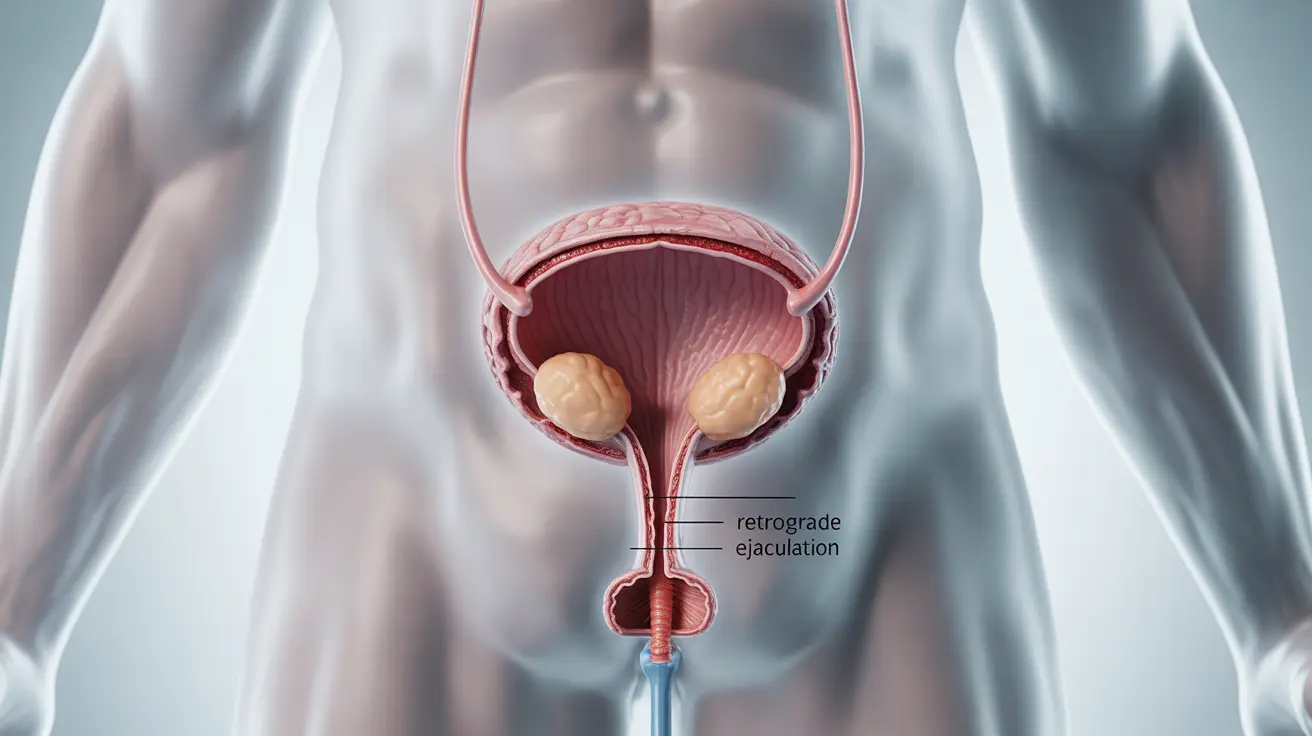Retrograde ejaculation is a condition where semen flows backward into the bladder during orgasm instead of being expelled through the penis. While this condition isn't harmful to overall health, it can significantly impact fertility and may indicate underlying health issues that require medical attention.
This comprehensive guide explores the causes, symptoms, and available treatments for retrograde ejaculation, helping you understand when to seek medical help and what options are available for managing this condition.
What Is Retrograde Ejaculation?
During normal ejaculation, muscles and nerves work together to propel semen forward through the urethra. However, in retrograde ejaculation, the bladder neck muscles don't contract properly, allowing semen to flow backward into the bladder instead of outward through the penis during orgasm.
This condition can be either partial or complete, meaning some men might experience a reduced amount of ejaculate while others may have no visible ejaculate at all during orgasm.
Common Causes and Risk Factors
Medical Conditions
Several underlying health conditions can lead to retrograde ejaculation:
- Diabetes
- Multiple sclerosis
- Spinal cord injuries
- Bladder or prostate surgery complications
- Neurological disorders
Medications
Certain medications may increase the risk of developing retrograde ejaculation:
- Alpha blockers for prostate enlargement or high blood pressure
- Antidepressants
- Some medications used to treat psychiatric conditions
- Certain blood pressure medications
Diagnosis and Symptoms
The primary symptom of retrograde ejaculation is little to no semen during ejaculation, despite experiencing normal orgasm sensations. Other indicators include:
- Cloudy urine after orgasm
- Dry orgasms
- Normal sexual function but reduced or absent ejaculate
- Fertility difficulties
Healthcare providers typically diagnose this condition through physical examination, medical history review, and post-orgasm urine analysis to check for the presence of sperm.
Treatment Approaches
Medication Options
Several medications may help improve bladder neck muscle function:
- Antihistamines
- Decongestants
- Tricyclic antidepressants
- Alpha-adrenergic medications
Fertility Solutions
For men seeking to father children, several fertility options are available:
- Sperm retrieval from post-orgasm urine
- Assisted reproductive technologies
- In vitro fertilization (IVF)
- Intracytoplasmic sperm injection (ICSI)
Prevention and Management
While not all cases of retrograde ejaculation can be prevented, certain steps may help reduce risk:
- Careful management of underlying conditions like diabetes
- Discussion of medication alternatives with healthcare providers
- Regular medical check-ups
- Proper post-surgery recovery and rehabilitation
Frequently Asked Questions
What causes retrograde ejaculation and how does it affect semen flow during orgasm?
Retrograde ejaculation occurs when the bladder neck muscles fail to close properly during orgasm, causing semen to flow backward into the bladder instead of forward through the penis. This can be caused by nerve damage, certain medications, or surgical procedures affecting the bladder neck muscles.
What are the common symptoms of retrograde ejaculation and how is it diagnosed?
The main symptom is little or no ejaculate during orgasm despite normal sensation. Diagnosis typically involves examining post-orgasm urine samples for sperm presence, along with a complete medical history and physical examination.
How can retrograde ejaculation be treated, especially if it causes infertility?
Treatment options include medications to improve bladder neck muscle function and fertility treatments such as sperm retrieval from urine for assisted reproductive technologies. The approach depends on the underlying cause and whether fertility is a primary concern.
Can medications or surgeries lead to retrograde ejaculation, and can the condition be reversed?
Yes, certain medications and surgical procedures can cause retrograde ejaculation. Reversibility depends on the underlying cause - if medication-induced, stopping or changing the medication may reverse the condition. Surgery-related cases may be permanent.
What fertility options are available for men with retrograde ejaculation who want to father children?
Men with retrograde ejaculation can still father children through various assisted reproductive techniques, including sperm retrieval from post-orgasm urine samples, IVF, and ICSI. Success rates depend on sperm quality and other fertility factors.




